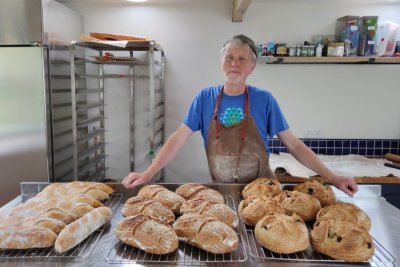Sustain / Real Bread Campaign / Articles
My baker’s dozen: Martin Naish
A Real Bread Campaign supporter answers our 13 questions.

Who are you?
My name is Martin. I live close to the centre of Newbury in Berkshire, where I have lived with my family for over 30 years.
What’s your relationship with the rise of Real Bread?
I’m a part-time baker with Solaris Bakehouse, my purpose-built microbakery, in our back garden.
What does Real Bread mean to you?
To me bread making is elemental. I feel there is something almost mystical about being able to transform flour, water and salt from a sticky bowl of chaos into a well-formed loaf of sourdough bread. I find making bread to be extremely therapeutic and a way to be creative by experimenting with different flours and types of bread.
Where, when and how did your love of Real Bread begin?
I started making bread over 40 years ago, mostly as an activity with my children. My son in particular loved playing at running a bread shop, so I encouraged him and his sister to bake along together.
What do you do?
I produce slowly-fermented Real Bread (mostly sourdough) from locally-farmed organic (and regenerative) flours. I bake on-demand and sell through my website to my local community. My working week is from Wednesday noon (when I finalise my bread orders and start my pre-ferments), through Thursday (mixing / working the doughs / bulk fermenting / shaping / retarding overnight) to Friday morning (baking / cooling) with delivery in the afternoon on foot. I’m catering for customers who are happy to have Real Bread at the weekend. I also offer bread making workshops.
What’s your aim, mission, ethos or motivation for doing what you do?
To me bread is not just an envelope for a sandwich filling. Without wishing to sound evangelical, I regard bread as the stuff of life. I feel truly sad when I hear people declare that they don’t like bread when they should be saying they don’t like what’s presented as bread in the average supermarket.
In my own small way, I hope to give my friends and neighbours the opportunity to discover that Real Bread is something to share and enjoy.
How did things develop?
My bread making habits were starting to outgrow our domestic kitchen, so when I retired, I decided it was time to create my own microbakery.
Rather than rent premises, it made better financial sense to build our own. We demolished our rickety old asbestos double garage, hired a local architect and local builder (a friend) to design and create a space where I could bake bread. It also meant my wife could reclaim her kitchen ;-}
Did you have a ‘screw it, let’s do it’ moment or other epiphany?
I took early retirement from a long career as a software engineer (prior to that, a geologist) deciding that life is much too short to carry on in the same old rut. I felt it was high time to take my bread making from passion to (part-time) profession.
What and who has helped and inspired you along the way?
It all really started in a shipping container. I enrolled on a rye bread making course with a wonderfully inspiring baker called Lucie Steele, who ran her business (Birch Bread) from a converted shipping container in the back yard of her cottage, deep in a Berkshire wood. There I learned how to make Real Bread for the first time, which set me on the path to becoming an enthusiastic baker. I followed this up with at least four more courses over the years, including a truly memorable three-day one with Richard Bertinet at his cookery school in Bath.
What have been your biggest challenges so far and how you have tackled them?
Getting through the building application and build stages for my microbakery was a major hurdle. It involved some important compromises because we’re in a quiet, residential part of Newbury.
From the actual baking perspective, I found scaling up bread making from a domestic oven to a proper bread oven to be both a game changer and a major challenge. It was a matter of trial and error and lots of practice.
What have been your highlights so far?
Discovering a ready-made market for Real Bread almost on my doorstep. I expected my business to be a slow start, but it was an immediate avalanche of orders from our local community after distributing my daughters hand-printed fliers around the local streets.
Do you have any top tips?
- Be brutally realistic from the get-go. Start slowly and try not to over-extend.
- Learn how to say no, politely but assertively.
- Building a solid base of repeat customers if possible
- Use the best quality ingredients you can afford and settle on a good base set of flours and bready offerings.
- Don’t try to please all tastes - it’s just not possible.
- I only bake-on-demand, so customers order through my website and pay up front. This obviously doesn’t suit everyone, but it certainly reduces wastage and the hassle of chasing up unpaid invoices.
- A website of some description is a must-have. You can of course build your own on something like Wix if your needs are straightforward, but if you want to operate a bake-on-demand model, I suggest getting a professional agency to help. I used Colab in Reading.
What’s next?
Learning to make pastries. I’ve been experimenting with dairy-free mainly because the rest of my family are dairy intolerant. There are a lot of plant-based milks and butters available now, and although they can’t exactly match the real thing, they can get fairly close.
Want to share your baker’s dozen?
Find out how.
See also
Published Tuesday 20 August 2024
Real Bread Campaign: Finding and sharing ways to make bread better for us, our communities and planet.

